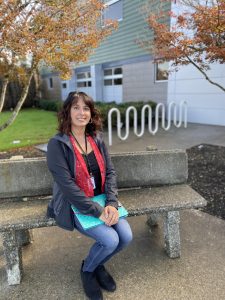Angie Frey has a message for parents of children within the juvenile justice system: you are not alone.
 It’s a message she delivers twice a week as a parent advocate at juvenile court hearings, at group meetings and through her new website Pathways to Hope Network, which provides resources and support for parents. “I’m there to advocate for them and honor the struggle that their family is facing in this moment, however they choose to deal with that,” says Frey. “I don’t want people to feel alone and isolated in this. It’s happening all the time, everywhere.”
It’s a message she delivers twice a week as a parent advocate at juvenile court hearings, at group meetings and through her new website Pathways to Hope Network, which provides resources and support for parents. “I’m there to advocate for them and honor the struggle that their family is facing in this moment, however they choose to deal with that,” says Frey. “I don’t want people to feel alone and isolated in this. It’s happening all the time, everywhere.”
Society can be quick to judge parents whose children become entangled with the law, as Frey knows from experience. “My first encounter with the juvenile courts was when someone I loved ended up sitting in that courtroom,” she says. “It really wasn’t until that moment that I realized what a lonely place that is.”
Many parents feel ashamed while also wanting to protect their child from being labeled or judged, and the end result is that they often don’t seek support from friends or family. “It’s a tough thing to talk about,” says Frey. “I’ve had so many people come up to me and say, ‘My child went through this and I never told anybody.’ That child is now a grown and successful adult, but the parent has held on to the shame and fear of people judging them.”

Frey had been visiting the Thurston County Courthouse on her own since 2016, but in 2017 the county agreed to make her an official volunteer and parent advocate. On juvenile hearing days, she arrives early and introduces herself to parents. Probation counselors will let her know when a family that is particularly struggling is scheduled to come in so that she can speak with them. “People who have kids who are in and out a lot often have an especially hard time,” says Frey.
For some parents, she answers basic questions, defining terms like ‘arraignment’ and ‘adjudication hearing’ and helping them find out who their attorney is. She also offers encouragement during and after difficult moments. “It’s different levels of support for different people,” says Frey. “It might be a hug and sitting next to a mom and holding her hand while her heart is breaking in court for one person, while for someone else, it might just be checking back in and answering a quick question about what a pretrial means.”
Her decision to work with other parents happened gradually, but it can be traced back to one moment at church during a sermon about purpose and pain. At the time, she rejected the idea that there could be any purpose within her current excruciating experience. But later, she reconsidered. “I started thinking about what it was like being in court,” she says. “I would always go alone, and it meant so much when another mom would smile at me when I went by or touch my shoulder when she could see I was upset. It was those little things that say, ‘I see you in this moment.’”
The first day she drove to the courthouse, she became so overwhelmed by emotions connected to her previous experiences of the building that she was afraid to go inside. Still, she continued to go, attending hearing after hearing. Initially she didn’t talk to anyone, but eventually she gathered her courage and began to approach other parents. “The great thing was that as I made the decision to return again and again, all the negative experiences I’d had driving to the courthouse were replaced with these great opportunities to connect with people,” she says.

In August 2019, she launched the Pathways to Hope Network website to fill a vacuum in online resources. “I was searching for something out there to support parents and when I looked online, I couldn’t find it,” Frey says. “The website is such an important tool. It includes an FAQ page and some local and national resources. Right now, I’m working on building social media tools like a closed Facebook group so parents have another way of connecting.”
Over time, she’s developed an effective working relationship with court officers and probation counselors. Families can enter the system with an “us vs. them” mentality which doesn’t serve anyone, she notes, so breaking down those barriers improves the overall situation. “You can’t even begin to heal when you’re on the defensive,” says Frey. “It helps once they get into probation when there isn’t that initial hostility.”
Ultimately, she hopes that her efforts help families to heal. “My intent is for people to learn that they can walk through hard things together and come out the other side,” she says. “Even if life might be different, it can still be good. There’s no reason for anyone to go through this alone.”
For more information, visit the Pathways to Hope Network website.


















































